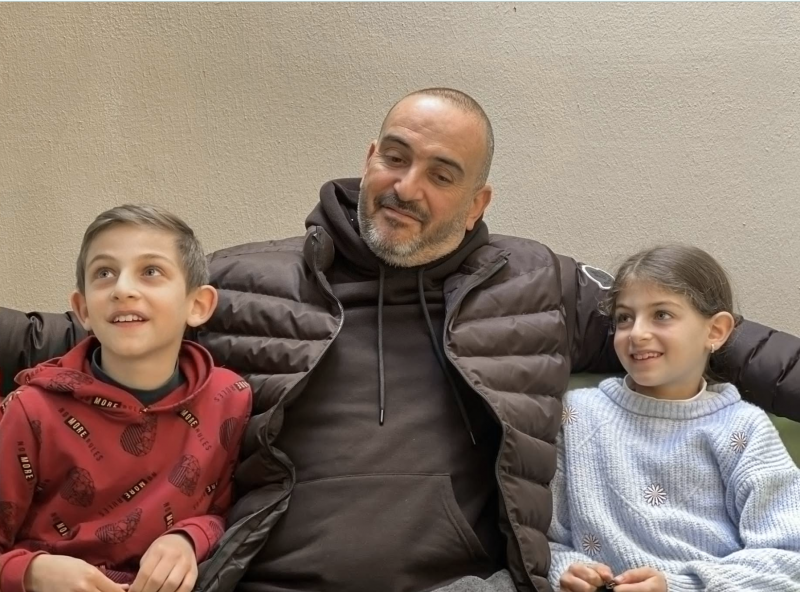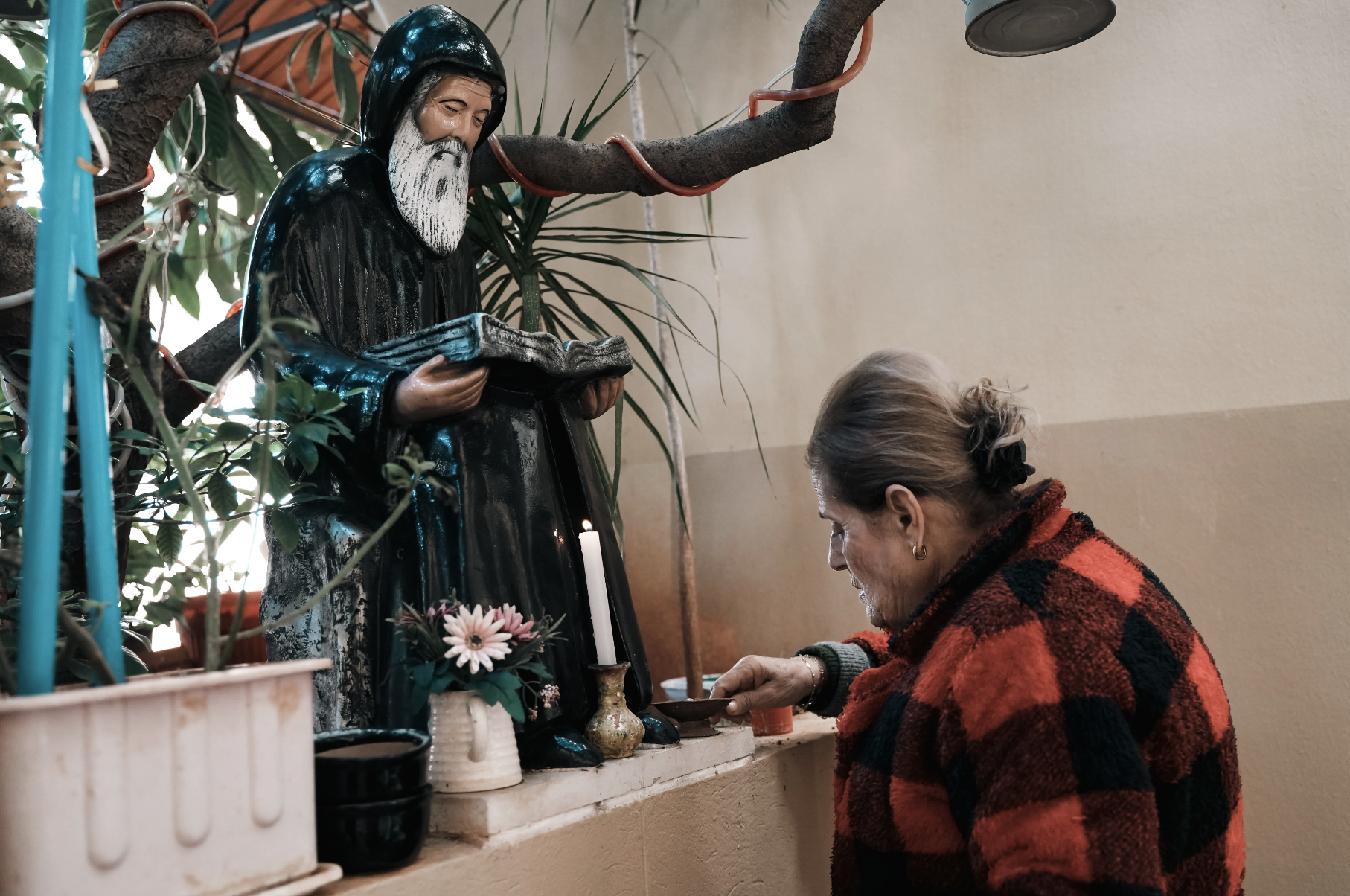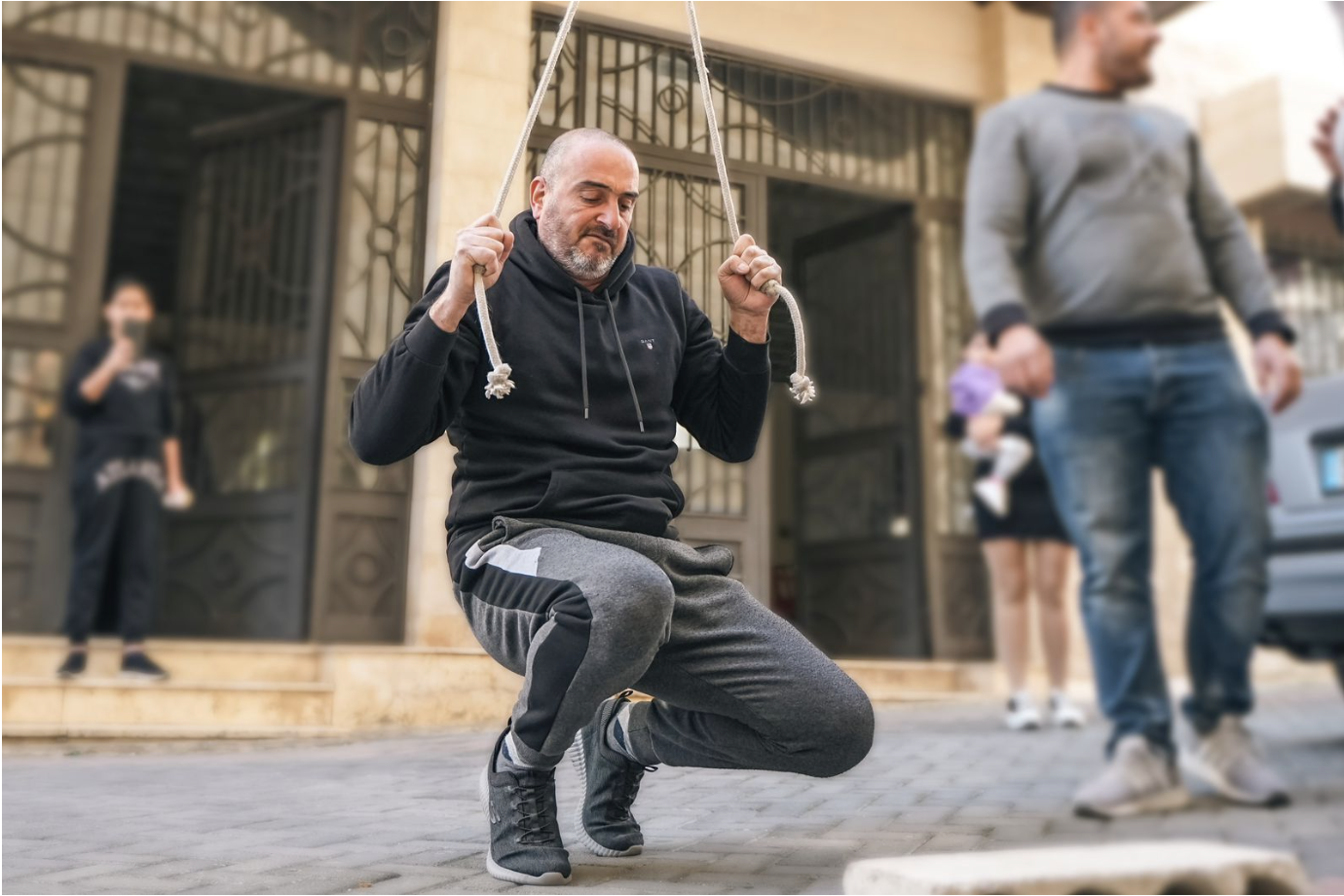
Bassel Habkouk surrounded by his children, Bechara and Marie-Lynn, in the garden of their house in Maghdoucheh, South Lebanon, February 20, 2023. (Photo: Mohammad Yassine/L'Orient-Le Jour)
“Don't travel, dad. Not this time.”
Trapped under the rubble of the Ozcan Hotel in Antakya, Turkey, Bassel Habkouk recalled the words his eldest son, Bechara, said to him the day before he left.
The 47-year-old, who arrived in Turkey a few hours before a massive earthquake took the lives of more than 44,300 people, never thought he would be buried alive in the dark and cold for more than 50 hours.
Buried alive
“Around 4:15 a.m., my bed started to shake, the walls of the room started to pitch. I woke up with a start,” recalled Bassel as he pressed his fingers together. He says his friend Elias was already looking for a way out of their hotel room.
“It is a tremor, we must flee,” Elias said. The two men rushed for the stairs but didn't get there. They had barely run ten meters when the power went out.
The building, wobbling, began to collapse. A huge weight crashed against Bassel's right shoulder and numbered his body.
“I felt like I was falling into a void. When I opened my eyes, everything was black. I was on the ground with my face pressed to the ground. I understood that I had survived, but I had the impression that I was buried alive,” Bassel said.
Trapped a little further under the rubble, his friend was plagued with fear:
“Bassel, help me, I can't move,” Elias said with a trembling voice. Bassel tried in vain to calm his friend. Wedge into a space less a square meter wide, he was totally powerless. He heard Elias crying out: “Don't leave me.” After six hours, a heavy silence sets in.
Bassel was shivering with cold. He could feel an injury in his back and he was distracted, but refused to let go. The words of his son haunted him. He had no right, not to return, not to survive.
After a few hours, he pulled himself together and managed to turn around and lie on his back. Crushed under the rubble, he rubbed his heart to “feel alive in this sarcophagus that used to be the hotel.”
Bassel's fingers only felt the cold and ruins. After many attempts, he managed to find his backpack containing his cell phone and some food. He tried to contact the Turkish emergency services, but the telephone network was down.
“Left by myself, I understood that the race against time had begun. It was as if my life was on hold,” he said with a faded look.
Anxiety in Maghdoucheh, but also faith
For his family in South Lebanon, awakened by the earthquake, the wait for news of Bassel seemed endless..
On Feb. 6, a heavy anguish overwhelmed the village of Maghdoucheh, his hometown where he volunteered with the Civil Defense.
Dozens of residents paced the aisles of the Our Lady of Maghdoucheh Church, located in the village's square. Some lit candles for him, some prayed the rosary. Residents said they were confident “it is not his time to go.”
 Bassel Habkouk's mother lights a candle in front of a statue of Saint Charbel. (Photo: Mohammad Yassine/L'Orient-Le Jour)
Bassel Habkouk's mother lights a candle in front of a statue of Saint Charbel. (Photo: Mohammad Yassine/L'Orient-Le Jour)
Gathered in the family house in the early morning hours, Bassel's neighbors and relatives refused to think he was dead.
“I thought that if Bassel was alive, he would have reassured me already,” recalled his mother, her eyes fixed on a statue of Saint Charbel in the garden. “But I knew God would not abandon him.”
Bassel's children, however, could not grasp the magnitude of the tragedy.
“I knew dad wasn't answering, but I didn't understand why,” said Lynn, his nine-year-old daughter.
After sending her children to their uncle's house to distract them from the pain and anxiety, Bassel's wife asked her Turkish friend, Moussa, to go to the hotel where Bassel had been staying.
The long wait
It was more than 24 hours after the earthquake before rescue operations began near the ruins of the hotel.
“When the cold worsened, piercing my immobile body, I understood that the first night had set in,” he said. But a fierce energy animated him. He refused to let himself die.
From time to time, he cried for help and knocked against the wall with a pipe he found, hoping to alert rescuers to his presence. The hoarse voice of another survivor, trapped under the nearby rubble, mingled with his own.
Moussa and his cousins arrived in Antakya on Feb. 7, the day after the quake. They shouted Bassel's name loudly throughout the neighborhood and even rescued five other people before finally locating Bassel later that evening.
Still, it not until roughly 7 am the following morning that the rescuers were able to extract him.
The great necropolis
When Bassel emerged from the rubble, the city was unrecognizable.
On both sides of the hotel, everything was razed. Flattened houses, fallen rocks and damaged shops were everywhere. The same fear, the same anguish, the same desolation was everywhere.
The streets were transformed into heaps of destruction. The area was a great necropolis.
“The earthquake wiped it all,” Bassel said. “Now I know the smell of death.”
 Back in Lebanon, Bassel Habkouk hastened to ring the bells of the Church of Our Lady of Maghdoucheh. (Photo: Mohammad Yassine/L'Orient-Le Jour)
Back in Lebanon, Bassel Habkouk hastened to ring the bells of the Church of Our Lady of Maghdoucheh. (Photo: Mohammad Yassine/L'Orient-Le Jour)
Bassel hurried to reassure his family but refused to leave Turkey until Elias was also pulled out from the rubble, even though hope of finding survivors was fading.
After he was released from the hospital in Adana, Bassel returned to the hotel and began his own search for his friend. A week after the tragedy, he identified Elias's lifeless body, extracted by a Lebanese Civil Defense team.
Back in Lebanon, he hurried to the village square and rang the church bells. The people rushed to welcome him.
“I often travel for work, but this was the first time Elias insisted on accompanying me. It is as if death awaited him,” said Bassel with deep sadness. His daughter gently stroked his hand.
“Today I am born again, but it will not be the easiest thing to regain a sense of normalcy.”
This article was originally published in French in L'Orient-Le Jour. Translation by Joelle El Khoury.